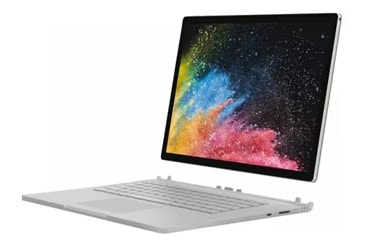Back to School Buying Guide: How to Choose a Laptop for College
Posted on September 02, 2020 By Alison P
If you're heading to college for the first time, the most important thing you will need is a laptop. You'll use your laptop for a wide variety of applications:
- Classwork
- Streaming movies, shows and music
- Social media and staying in touch with friends and family
- Gaming
- Storing photos and videos
- And much more!
In a post-pandemic world, education is going virtual more than ever before. Even if you're living on campus, you may have hybrid classes, with some meetings in a classroom and others online. That means it's even more important to have a reliable laptop for attending your courses, completing assignments and maybe even taking exams.
So, what is the best laptop for a college student? The answer will depend on your specific needs and preferences, and you'll want to find one that will last throughout your whole college experience.
First Step in Choosing a Laptop
Before you begin your search for the best college laptops, the first thing you should do is check with your school or department for specific system requirements. Some colleges, universities and major-specific programs want their students equipped with a Windows-based PC Laptop to cut down on software incompatibility issues. Others will let you use almost any operating system, but to be on the safe side, you should always check first. Once you get any specifications from your school, narrow your search down further by considering some of the most frequently-asked questions when shopping for a laptop for college.
What Screen Size Should I Get?
Keep it light. A big screen may seem awesome visually but hauling it back and forth from your dorm to class or the library can be a real pain. The most portable laptops have a screen size of 11 to 14 inches and usually weigh five pounds or less, making them much easier to transport.
However, keep in mind the user experience of smaller screens may be different than what you're used to, so you might need some time to adjust. To find the best small laptop for college, try out a few models in person to make sure you're comfortable with their size.
How Much Memory Do I Need on My Laptop?
The work demand of the classes you take will influence the amount of memory, or RAM, you'll want or need. 4GB is ample for the average college student, allowing you to easily browse the web, create documents, and generally do some light multi-tasking. If you can find a model with 8GB of RAM at a competitive price, you should get it. At that amount, you can do some light gaming, some basic photo and video editing, and some more strenuous multi-tasking without the computer slowing down too much. The more RAM you have, the more your computer will be able to handle all at once (running multiple programs, rendering games, etc.). If you plan on gaming, or watching a movie while you work on your assignments, then you'll certainly need all the RAM you can get.
How Much Storage Do I Need on My Laptop?
These days, most laptops come standard with 256GB of storage. For college kids who use their laptop for classes, media and storing photos, etc., this may not be enough. Consider going with 512GB (or even higher if you think you'll need it) so you probably won't have to worry about running low on storage space when you need it. You should definitely consider maxing out on storage if you're majoring in a field related to media arts as you'll likely be working on large-scale projects all throughout your time at school.
Most laptops also have USB ports, so you can expand their storage capacity through external storage as well. Upgrading to a 500GB or 1TB hard drive is a cost-effective option, but if you're not a video junkie or an aspiring filmmaker, you probably won't need that much storage.
What Are the Benefits of Chromebooks?
The key advantage of having a Chromebook is that nothing is saved locally. Instead, all your apps, preferences, documents and data are saved on Google's servers in the cloud. This means if you lose your machine, have it stolen or spill a cup of coffee over it, there is no risk of your information being lost.
The Chromebook also offers superior security. Say you visit a suspicious website by clicking on a bad link, accidentally open a spammy email attachment, or download a program that has a fishy origin - a Chromebook has you covered. Due to the device's stateless operating system, which has built-in multi-layered protection, viruses are one less thing to worry about.

What About Hybrids?
There are plenty of reasons to scoop up a 2 in 1 laptop, starting with the fact that you'll have one device that can double as a laptop and tablet. When you need to get work done, you can use a keyboard and run desktop programs. When you want to kick back on the couch and check Facebook or watch videos, you can go with the touch screen display instead! It's a great option for college students and hybrids come in either a detachable design like Microsoft Surface laptops use, or a convertible approach, in which the notebook's hinge rotates 360 degrees for a similar effect.
Are MacBooks Just as Good?
MacBooks are another great choice for your classes! Even lower tier Macs come with enough RAM to allow you to multi-task at will. Due to Apple's unique “M” chips, these machines are often packed to the gills with processing power, which makes them great for video and photo editing. The one thing to bear in mind about Macs is that they use Apple's own operating system, MacOS. Many people are used to using Windows computers, so it may be take some time to get used to using a Mac.
What is a Good Processor Speed for a Laptop?
Laptops offer a wide selection of processors, but it's rarely worth paying extra for a faster CPU. Most laptops sold these days are more than fast enough for the average college student's tasks. Web browsing, spreadsheets, simple programming, web development, word processing and social media browsing don't require a supreme processor. A powerful processor will just drain your battery faster anyway. Anything labeled Intel Core i3 or i5 should meet the average student's needs. The only reason you would need anything higher would be for gaming in between classes, in which case it may be better for you to shop around for gaming laptops instead.
What About Battery Life?
With a day filled with classes and extracurricular activities, battery life is important. Many laptops today have multiple battery options. Figure out where battery life ranks in your list of importance when purchasing a laptop for school. If you think you'll need your laptop for long periods without consistent outlet access, you may need a laptop with a large battery. Unfortunately, a big battery adds more weight, but the extra weight might be well worth it if it means not having to plug in the entire day.
If you want to squeeze the most juice out of your laptop's battery try following these 9 tips for longer laptop battery life.
Are There Any Other Features I Should Look Out For?
There are a few other features that you should consider looking for before committing to any laptop. As of this writing, every laptop using the Windows operating system uses Windows 11, which comes with a variety of features that help out with multi-tasking and general productivity when it comes to working. Just to name a few, you can customize an entire panel of widgets that grant you easy access to the apps you use the most, and you have more options when it comes to creating multiple virtual desktop sessions at once. One of your virtual desktop sessions might be for your schoolwork, while another is for your personal use. With Windows 11, you can customize each of these individually to keep your background professional on one laptop and personal another. For more features, you may want to consider looking at Windows CoPilot+ laptops. These computers come with a more advanced version of Windows AI assistant Copilot. This AI is capable of helping you with all kinds of tasks like editing images and adds a bunch of quality-of-life features like live captions on any content you watch.
How Much Should I Spend?
From basic laptops to models with all the bells and whistles, it's critical that your choice fits your price range. Try making a list of all the features you want and rank them in order of priority. Look for a laptop model that offers as many of the most important elements as possible without breaking the bank. Also, try to shop for laptops on sale to keep the price down.
Finding the right laptop for your time at college is an important step in ensuring that you're successful in your classes. When shopping around, make sure to take a look at the specifications on each model to see if they'll be able to keep up with your schoolwork and your hobbies. Try to keep to a budget, and shop during sales to get the best laptops at discounted prices. We wish you good luck with your search, and more importantly, with your studies.